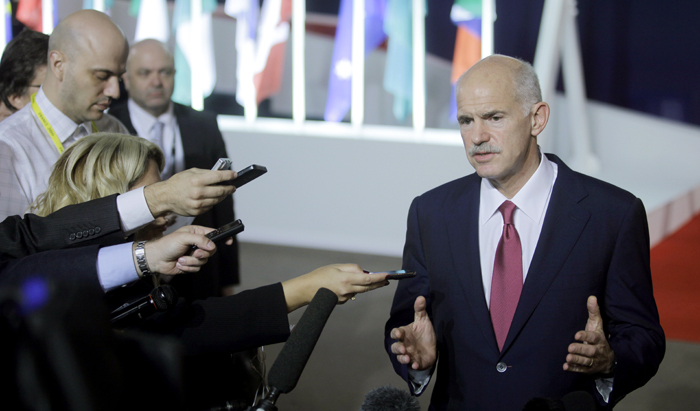ATHENS, Greece — Ignoring increasing calls to step down, Greece’s prime minister announced today he would seek emergency talks with the opposition conservatives after they agreed to back the latest European bailout for Greece.
Prime Minister George Papandreou, speaking at an emergency Cabinet meeting, warned that an early election was too dangerous because it would force Greece into leaving the 17-nation euro currency.
Papandreou sparked a continentwide crisis Monday when he announced he would put the latest European deal to cut Greece’s massive debts — an accord that took months of negotiations — to a referendum. The idea horrified other EU nations and Greece’s creditors, triggering turmoil in financial markets as investors fretted over the prospect of Greece being forced into a disorderly default.
Two officials close to Papandreou said today the referendum idea has now been scrapped, after the debt deal won some support from the opposition.
“Elections as a solution, today and at this moment, would mean a much greater danger of bankruptcy and of course exit from the euro,” the prime minister declared in the meeting. “I will talk to (opposition leader) Mr. Samaras so that we can examine the next steps, based on a wider consensus.”
He declared that he was pleased “because even if there is no referendum” he was glad that all the discussion “has at least brought many people toward a rational view” of Greece’s dire economic situation.
The drama today in Greece sent immediate ripples throughout Europe. Premier Silvio Berlusconi’s government in Italy was teetering as well after it failed to come up with a credible plan to deal with its dangerously high debts, and Portugal demanded more flexible terms for its own bailout. The European Central Bank made a surprise decision to cut interest rates by a quarter of a percentage point to 1.25 percent, responding to the financial turmoil.
The topic of what to do about Greece dominated the G-20 meeting in the French resort of Cannes, where the leaders of the world’s economic powerhouses had gathered to solve Europe’s debt crisis, which threatens to push the world back into recession.
Prior to Papandreou’s emergency meeting, several Greek lawmakers had called for a coalition unity government that would approve the bailout package without a referendum and make sure the country receives vital funds to prevent bankruptcy.
Today’s turmoil began after Papandreou’s own finance minister, Evangelos Venizelos, broke ranks with him today and declared his opposition to a referendum.
“Greece’s position within the euro area is a historic conquest of the country that cannot be put in doubt,” Venizelos said, adding it “cannot depend on a referendum.”
Venizelos said the country’s attention should instead be focused on quickly getting a crucial €8 billion ($11 billion) installment of international bailout funds, without which it faces bankruptcy with weeks.
In Cannes, French President Nicolas Sarkozy and German Chancellor Angela Merkel met with Papandreou on Wednesday night and told him Greece would not get the latest funds from its existing bailout until after the vote. They also any referendum should be on whether Greece wants to stay in the eurozone or not, suggesting that it be held no later than Dec. 4.
Greece’s new debt deal would give the country an extra €100 billion ($138 billion) in rescue loans from the rest of the eurozone and the IMF — on top of the €110 billion ($152 billion) it was granted a year ago — and would see banks forgive Athens 50 percent of the money it still owes them. The goal of the program is to reduce Greece’s massive debts to the point where the country is able to handle its finances without constant bailouts.
Speaking in Cannes, Papandreou said he was forced to call the referendum after it became clear there was no “broad support” from opposition parties for the bailout deal reached with the rest of the eurozone and big banks just a week ago.
Rumors abounded today about a possible Papandreou resignation, but his office denied the reports. State TV said lawmakers had sounded out former European Central Bank vice president Lucas Papademos as a possible unity government leader.
The political drama is not over. Papandreou has called a confidence vote on his government for Friday night. But Socialist lawmaker Eva Kaili said she would not vote in favor, which would mean the governing party would have the bare minimum 151 votes in the 300 member parliament, barring support from independents.
Earlier in the day, Antonis Samaras, leader of the conservatives, called for a transitional government to ratify the European debt deal and prepare for early elections.
“Under the weight of these dramatic events, we have witnessed a crisis of the ability to govern. The country must immediately return to a state of normality,” Samaras said. “Under the current conditions, the new debt deal is unavoidable and must be safeguarded.”
A conservative party official said a transitional government should not include members of any political party, and especially not their own. The official spoke on condition of anonymity to disclose the party’s thoughts.
The two other European governments besides Greece that have received bailouts — Portugal and Ireland — have seen their governments fall during the economic turmoil.
Send questions/comments to the editors.



Success. Please wait for the page to reload. If the page does not reload within 5 seconds, please refresh the page.
Enter your email and password to access comments.
Hi, to comment on stories you must . This profile is in addition to your subscription and website login.
Already have a commenting profile? .
Invalid username/password.
Please check your email to confirm and complete your registration.
Only subscribers are eligible to post comments. Please subscribe or login first for digital access. Here’s why.
Use the form below to reset your password. When you've submitted your account email, we will send an email with a reset code.